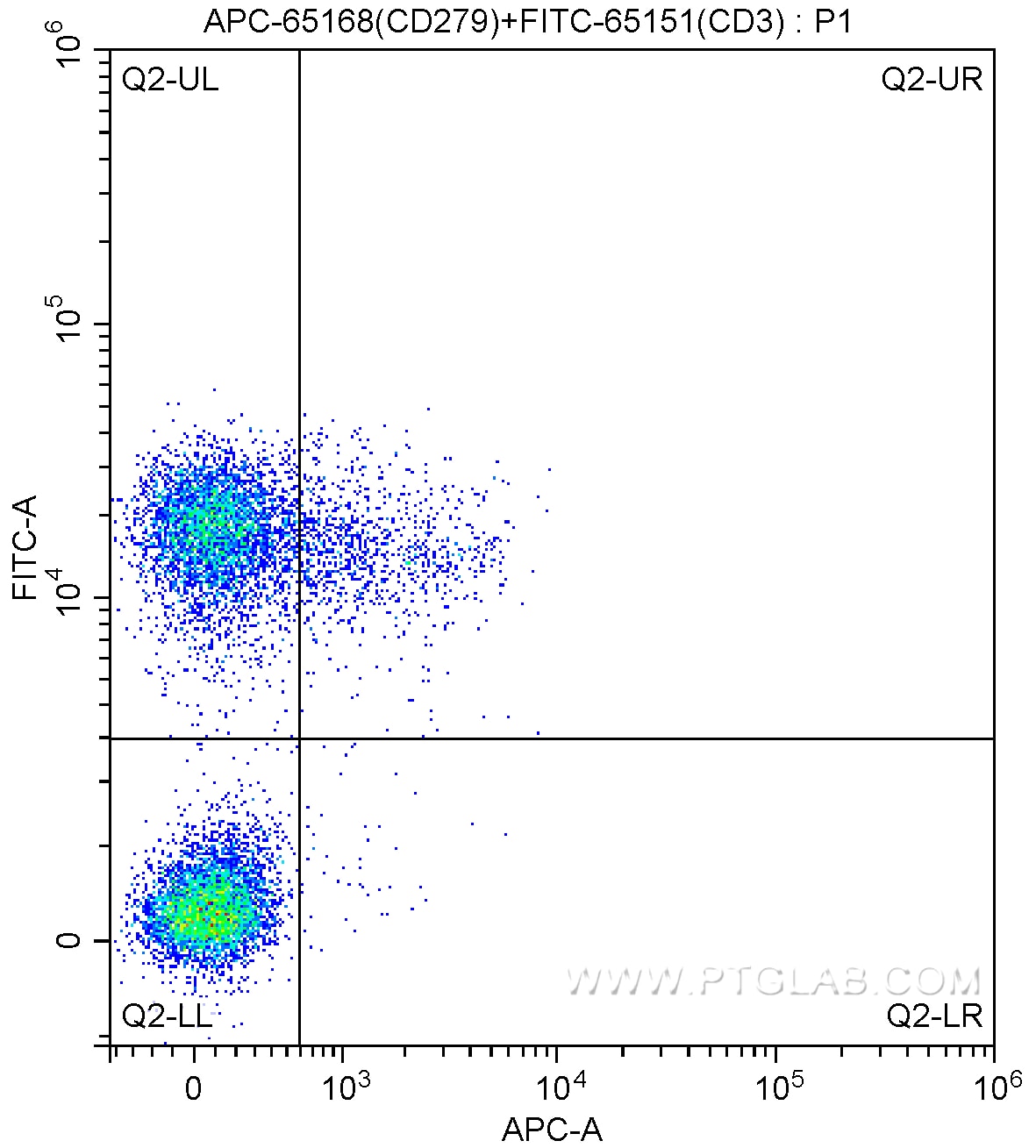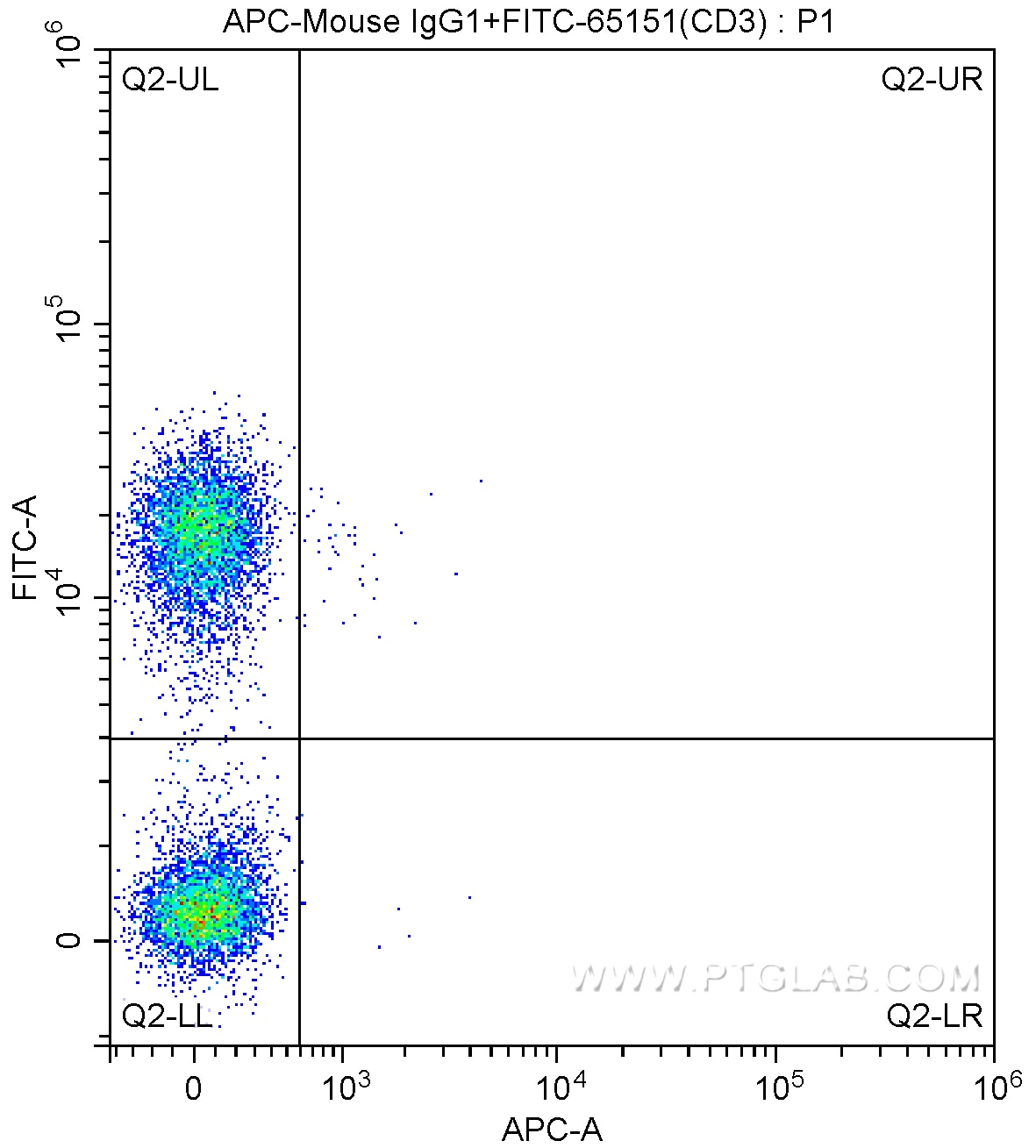PD-1/CD279 Monoklonaler Antikörper
PD-1/CD279 Monoklonal Antikörper für FC
Wirt / Isotyp
Maus / IgG1, kappa
Getestete Reaktivität
human, nicht-humane Primaten
Anwendung
FC
Konjugation
APC Fluorescent Dye
CloneNo.
EH12.2H7
Kat-Nr. : APC-65168
Synonyme
Geprüfte Anwendungen
| Erfolgreiche Detektion in FC | humane mononukleäre Zellen aus peripherem Blut Zellen |
Empfohlene Verdünnung
| Anwendung | Verdünnung |
|---|---|
| This reagent has been pre-titrated and tested for flow cytometric analysis. The suggested use of this reagent is 10 µl per 10^6 cells in a 100 µl suspension or 10 µl per 100 µl of whole blood. | |
| Sample-dependent, check data in validation data gallery | |
Produktinformation
APC-65168 bindet in FC PD-1/CD279 und zeigt Reaktivität mit human, nicht-humane Primaten
| Getestete Reaktivität | human, nicht-humane Primaten |
| Wirt / Isotyp | Maus / IgG1, kappa |
| Klonalität | Monoklonal |
| Typ | Antikörper |
| Immunogen | Recombinant human CD279 protein |
| Vollständiger Name | programmed cell death 1 |
| Berechnetes Molekulargewicht | 288 aa, 32 kDa |
| GenBank-Zugangsnummer | BC074740 |
| Gene symbol | PD-1 |
| Gene ID (NCBI) | 5133 |
| Konjugation | APC Fluorescent Dye |
| Excitation/Emission maxima wavelengths | 650 nm / 660 nm |
| Form | Liquid |
| Reinigungsmethode | Der gereinigte Antikörper ist mit Allophycocyanin (APC) unter optimalen Bedingungen konjugiert. Das Konjugat wird mit Größenausschluss-Chromatographie gereinigt. |
| Lagerungspuffer | PBS with 0.09% sodium azide |
| Lagerungsbedingungen | Store at 2-8°C. Avoid exposure to light. Stable for one year after shipment. |
Hintergrundinformationen
Programmed cell death 1 (PD-1, also known as CD279) is an immunoinhibitory receptor that belongs to the CD28/CTLA-4 subfamily of the Ig superfamily. It is a 288 amino acid (aa) type I transmembrane protein composed of one Ig superfamily domain, a stalk, a transmembrane domain, and an intracellular domain containing an immunoreceptor tyrosine-based inhibitory motif (ITIM) as well as an immunoreceptor tyrosine-based switch motif (ITSM) (PMID: 18173375). PD-1 is expressed during thymic development and is induced in a variety of hematopoietic cells in the periphery by antigen receptor signaling and cytokines (PMID: 20636820). Engagement of PD-1 by its ligands PD-L1 or PD-L2 transduces a signal that inhibits T-cell proliferation, cytokine production, and cytolytic function (PMID: 19426218). It is critical for the regulation of T cell function during immunity and tolerance. Blockade of PD-1 can overcome immune resistance and also has been shown to have antitumor activity (PMID: 22658127; 23169436).
Protokolle
| PRODUKTSPEZIFISCHE PROTOKOLLE | |
|---|---|
| FC protocol for APC PD-1/CD279 antibody APC-65168 | Download protocol |
| STANDARD-PROTOKOLLE | |
|---|---|
| Klicken Sie hier, um unsere Standardprotokolle anzuzeigen |



